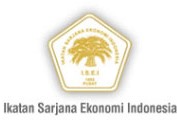Determinant of Macro-Economics: Does Income Inequality Influence Happiness? Evidence From Indonesia
(1) UIN Sunan Kalijaga Yogyakarta
(2) UIN Sunan Kalijaga Yogyakarta
(3) UIN Sunan Kalijaga Yogyakarta
(4) UIN Sunan Kalijaga Yogyakarta
Abstract
This research aims to see does income inequality determines the happiness of Indonesian. This is important because there is a unique condition where Indonesia to be one of the developing nations which have a complexity of the income inequality issue, but it still has a high happiness index rate. This research uses cross-sectional data consisting of multiple indicators of all the variables from 34 provinces of Indonesia such as inflation, unemployment, and government investment as the macroeconomic factors, which have a direct impact on income inequality as well as happiness index, and this research uses path analysis model.The result delineates that although macro economics variables and income inequality have negative correlation toward happiness of Indonesian, it it not fully effected on it because most happiness of Indonesians are coming from another aspect such as socio-culture and religiosity
Keywords
Full Text:
PDFReferences
Aiyar, S., & Ebeke, C. (2020). Inequality of opportunity, inequality of income and economic growth. World Development.
Becchetti, L., Masaari, R., & Naticchioni, P. (2014). The drivers of happiness inequality: Suggestions for promoting social cohesion. Oxford Economic Papers, 66(2).
Blejer, M. I., & Guerrero, I. (1990). The Impact of Macroeconomic Policies on Income Distribution: An Empirical Study of the Philippines. The Review of Economics and Statistics, 72(3).
Candra, S. A. (2017). Yogyakarta as The Hishest Income Inequality, But It Has The Most Happiest Society. Jakarta: Republika.id.
Clark, A. E. (2003). Unemployment As a Social Norm: Psychological Evidence From Panel Data. Journal of Labour Economics, 21(1).
Delhey, J., & Dragolov, G. (2014). Why inequality makes Europeans less happy: The role of distrust, status anxiety, and perceived confict. European Sociological Review, 30(2).
Deyshappriya, N. P. (2017). Impact of Macroeconomic Factors on Income Inequality and Income Distribution in Asian Countries. ADBI Working Paper No. 696.
Ferrer-i-Carbonell, A., & Ramos, R. (2014). Inequality and happiness. Journal of Economic Surveys,.
Hagerty, M. R. (2000). Social comparisons of income in one’s community: Evidence from national surveys of income and happiness. . Journal of Personality and Social Psychology, 78(4.
Haller, M., & Hadler, M. (2006). How social relations and structures can produce happiness and unhapiness: An International Comparative Analysis. Social Indicators Research, 75(2).
Helliwel, J. F., & Huang, H. (n.d.). How’s your government? International evidence linking good government and well-being. . British Journal of Political Science, 38(4).
Kang, W. C., Lee, J. S., & Song, B. (2020). Envy and Pride: How Economic Inequality Deepens Happiness Inequality in South Korea. Social Indicators Research.
Lakshmanasamy, T., & Maya, K. (2020). The Effect of Income Inequality on Happiness Inequality in India: A Recentered Influence Function Regression Estimation and Life Satisfaction Inequality Decomposition. Indian Journal of Human Development.
Layadr, R. (2005). Happiness Lessons From a New Science . USA: Penguin Press.
Lucas, R. A., Clark, Y., Georgellis, & E, D. (2004). Unmeployment Alters The Set Point for Life Satisfaction. Psychology Science, 15(1).
Malešević, P. L. (2008). Subjective economic well-being in transition countries: investigating the relative importance of macroeconomic variables. Financial theory and practice, 32(4), 519-537.
Newman, B. J., Johnston, C. D., & Lown, P. L. (2015). False consciousness or class awareness? Local income inequality, personal economic position, and belief in American meritocracy. American Journal of Political Science, 59(2).
Ochsen, C., & Welsch, H. (2011). The Social Cost of Unemployment: Accounting for Unemployment Duration. Applied Economics, 43(27).
Oshio , T., & Kobayashi , M. (2009). Regional income inequality and happiness: Evidence from Japan . Japan: Hitosubashi University.
Ouardighi, J. E., & Munier , F. (2019). Inflation, Unemployment and Happiness: empirical evidences of the contribution of Economic Growth. Bureau d'Économie Théorique et Appliquée.
Sireon, A. (2017). Inflation and Income Inequality. Prague Economic Papers, 26(6).
Solikhin, I. (2020, November 10). Peran al-Maslahah dalam Lingkup Ekonomi. (D. M. Lestari, Interviewer)
Suhendra, I., Istikomah, N., Ginanjar, R. A., & Anwar, C. J. (2020). Human Capital, Income Inequality and Economic Variables: A Panel Data Estimation from a Region in Indonesia*. Journal of Asian Finance, Economics and Business, 7(10).
Theresia P. R. (2016). The Determinants of Happiness in Indonesia . Mediterranean Journal of Social Sciences, 7(2).
Todaro, M. P., & Smith, S. C. (2012). Economic Development. New York: Addison-Wesley.
Wang, P., Pan, J., & Lou, Z. (2014). The Impact of Income Inequality on Individual Happiness: Evodence From China. Social Indocator Research.
Zagorsk, K., & Piotrowska, K. (2014). Does national income inequality afect individuals’ quality of life in Europe? Inequality, happiness, fnances, and health. Social Indicators, 117(3).
Refbacks
- There are currently no refbacks.

This work is licensed under a Creative Commons Attribution 4.0 International License.






